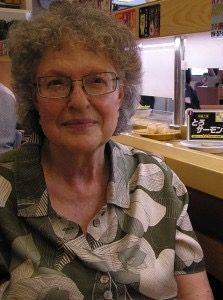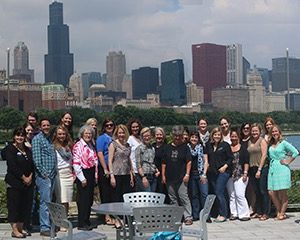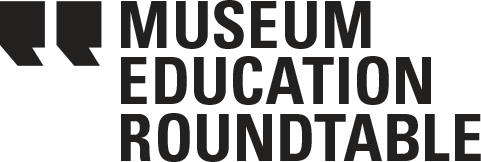Moonlighting for MER
What does moonlighting mean to you? Dictionaries define it as a second job after a main job’s hours, sometimes to earn extra income, sometimes to sharpen skills, sometimes to rebuild enthusiasm by learning something new.
For me, I’ve called my five years on the Museum Education Roundtable’s Board of Directors “moonlighting” because during those years MER helped me expand my horizons beyond the issues and concerns of my “day job.” And it often enabled me to do that after hours, “under the light of the moon,” encouraging me to reflect on the rewards, challenges and “what ifs” of my own career as well as to think, dream and even write about the museum education profession that is my passion.
To be honest, during my more than 30 years as a museum educator I sometimes let my passion literally drive me too far. There were days when I worked until midnight at a wonderful museum in the Chicago suburbs, and then stayed overnight at a local motel instead of commuting home. I did that because I was “on fire” with plans and projects – though what my family said is unprintable here! Eventually I sought positions closer to home, but like many museum educators everywhere, my plate was still overflowing.
 Things began to change for me when a colleague I admired told me that the Museum Education Roundtable had put out a call for nominations to its board, since some members were stepping down at the end of their terms of service. She said she had been a member of this board of volunteers and that serving the profession on the national level, as MER does, was one of the most rewarding personal and professional experiences of her career. She told me she thought I would feel the same way, and, ever a realist, she also said that being a MER board member looks great on a resume!
Things began to change for me when a colleague I admired told me that the Museum Education Roundtable had put out a call for nominations to its board, since some members were stepping down at the end of their terms of service. She said she had been a member of this board of volunteers and that serving the profession on the national level, as MER does, was one of the most rewarding personal and professional experiences of her career. She told me she thought I would feel the same way, and, ever a realist, she also said that being a MER board member looks great on a resume!
Thinking it was unlikely I’d be chosen, I nevertheless applied, was amazed and honored to be accepted, and have found all that she said about her experience has been true for me. Now my term on the board has come to an end and I’m taking a moment to look back on what has been an extraordinarily meaningful experience.
I joined the board in 2010, a time when MER, which began in 1969, was reflecting on its first 40 years and reaffirming that what sets it apart from other museum education service organizations is its publication of the Journal of Museum Education (JME). The JME is the only peer reviewed professional journal focused on our field, and its exploration of new thinking, challenges, and approaches for museum education calls for wide-ranging talents and skills. While the JME has a fantastic editor-in-chief, it is the energy, enthusiasm and inspiration of the board that produces and promotes the journal and also leverages its content with programs and products to engage museum educators and others nationwide and internationally.
All this was affirmed for me during my first board meeting when I honed the first new skill from my MER experience. That skill was listening. Before then, especially after I became an education department director, I often felt I needed to be the fixer, the problem solver. Now I was surrounded by some of the nation’s most creative thinkers and practitioners, people I most likely wouldn’t have met or been able learn from in any other way. Some were new professionals with fresh ideas, some were seasoned educators with years of experience to share. During this meeting, and the ones that followed, my head spun with ideas for my own programs as well as the discovery of new trends in the field that I hadn’t had time to follow before.
For the first time I was also invited to contribute on the national stage in ways I had never before imagined. Offered the chance to develop skills that interested me, I chose to become a member of an advocacy task force that eventually led to MER’s involvement in the national museum advocacy program led by AAM. And among the board’s various action teams, which include Revenue and Resources, Reader Engagement, and Editorial, I chose the Editorial Team. I had long enjoyed reading the JME and wanted to learn more about the processes involved in its production.
After a year on the team, I was asked if I would consider becoming a peer reviewer for the JME. I was nervous at the prospect, since my previous experience had largely consisted of self-editing my own copy for programs, departmental reports, or grant proposals. I was awed at the prospect of helping to edit articles for this national journal, and the support I received helped me develop the skills to become a better writer on both a personal and professional level.
 MER also provided me with paths to enhance leadership skills. The board annually elects officers and chooses chairs for each action team, and in 2013 MER’s president asked I if would chair the Editorial Action Team. I had some worries, because while I was becoming a better listener rather than a “fixer” at my day job, I feared I might fall back into old patterns as a MER chair. But thanks to the support of a remarkable co-chair and an extraordinarily talented team, I found I was able to lead by listening and then enable others to take ownership of projects that have expanded the scope and relevance of the JME. These have included leveraging the journal’s contents through Reader Guides, conference presentations, online “book clubs” and even this blog. Among the many personal and professional rewards of my time with MER, enabling others in these ways may be among the experiences I treasure the most.
MER also provided me with paths to enhance leadership skills. The board annually elects officers and chooses chairs for each action team, and in 2013 MER’s president asked I if would chair the Editorial Action Team. I had some worries, because while I was becoming a better listener rather than a “fixer” at my day job, I feared I might fall back into old patterns as a MER chair. But thanks to the support of a remarkable co-chair and an extraordinarily talented team, I found I was able to lead by listening and then enable others to take ownership of projects that have expanded the scope and relevance of the JME. These have included leveraging the journal’s contents through Reader Guides, conference presentations, online “book clubs” and even this blog. Among the many personal and professional rewards of my time with MER, enabling others in these ways may be among the experiences I treasure the most.
To be frank, “moonlighting” for MER does take time. Admittedly I was involved with MER business during some evening hours, perhaps crafting a JME peer review or reflecting on ideas for JME content, but I could do this from the comfort of my own home. As for meetings, while the board’s members’ from across the nation gather in person once a year, most board and team meetings take place by conference call. If a meeting was called for an early hour in my timezone, I could even “attend” in my bathrobe, munching on Cheerios and with a cat in my lap!
I’m now retired, both from my “day job” and as a MER board member, but I’ve remained a JME peer reviewer and also a volunteer for the Editorial Action Team. Volunteering has allowed me to keep that invaluable connection to fresh ideas, inspiring colleagues and opportunities for action that help me in my new role as an occasional consultant and guest lecturer, as well as a volunteer docent at the Art Institute of Chicago.
I’d like to end by paraphrasing some comments from the August 2015 MER blog post by Paige Faulkner, another board member whose term has come to an end. Her post describes in more detail the accomplishments that built upon the dreams and aspirations of MER’s founders, and most especially the strides forward in the last several years. I follow her thoughts here by saying that none of what MER has done for me personally, and what I hopefully have contributed, would have been possible without “the support and inspiration of amazing, knowledgeable, and passionate board members who are willing to keep dreaming the dream” for museum education, and who will be driving MER onward as it moves well into the 21st century.
If in reading this blog, you’ve been inspired by what you might gain and what you might contribute, please consider applying to become a MER board member. Applications are open until March 31st.
Carole Krucoff served as Head of Public Education at the University of Chicago’s Oriental Institute. Prior positions included Education Director at Naper Settlement, a living history museum near Chicago, and Associate Educator at the Chicago History Museum. She received the Association of Midwest Museums Distinguished Career Award in 2012. Now retired from the university, Carole is a museum education consultant with special interests in health and wellness programming. She is also a docent at the Art Institute of Chicago and a member of the Museum Education Department’s Diversity Committee.
Opening photo credit: selection from La nuit étoilée by Vincent van Gogh – bgEuwDxel93-Pg at Google Cultural Institute, zoom level maximum, Public Domain, https://commons.wikimedia.org/w/index.php?curid=22493417

